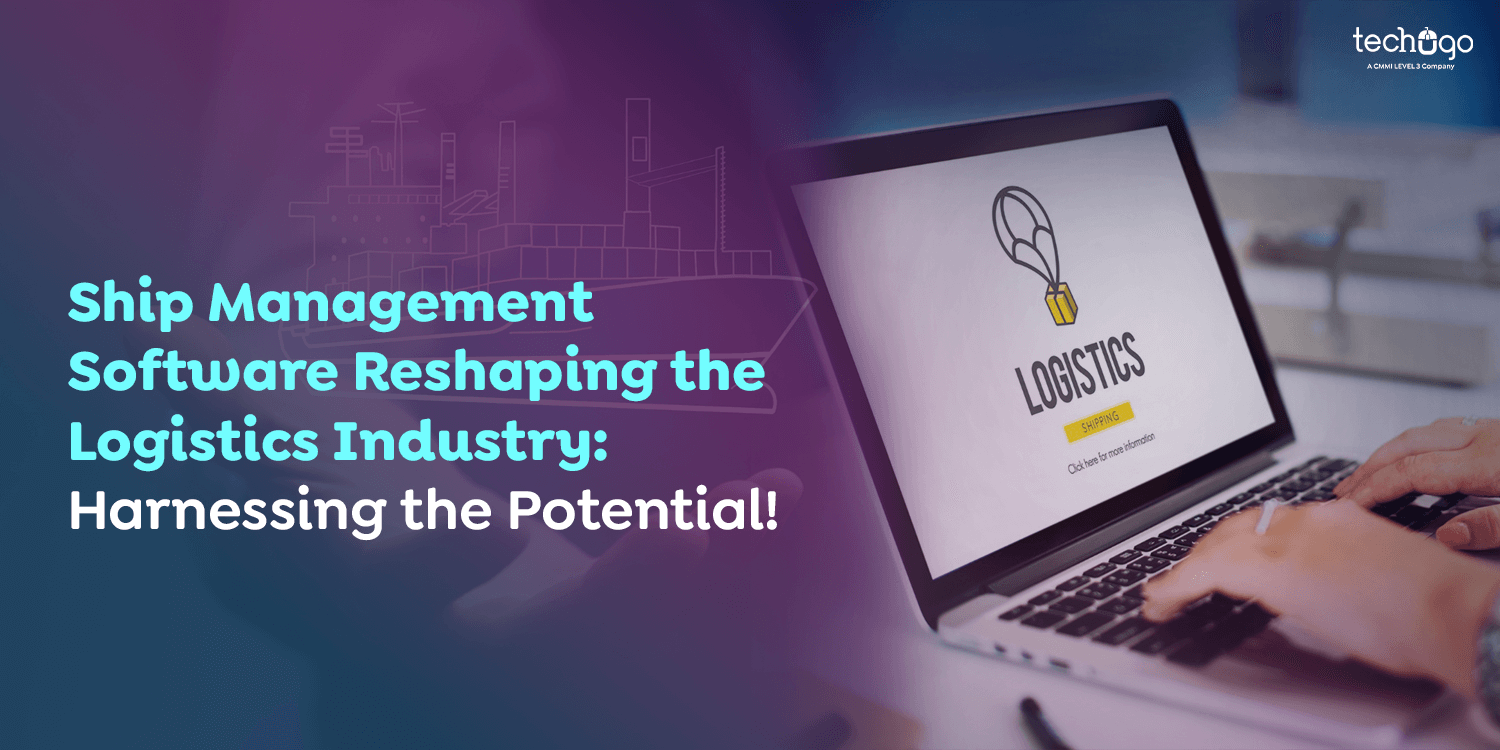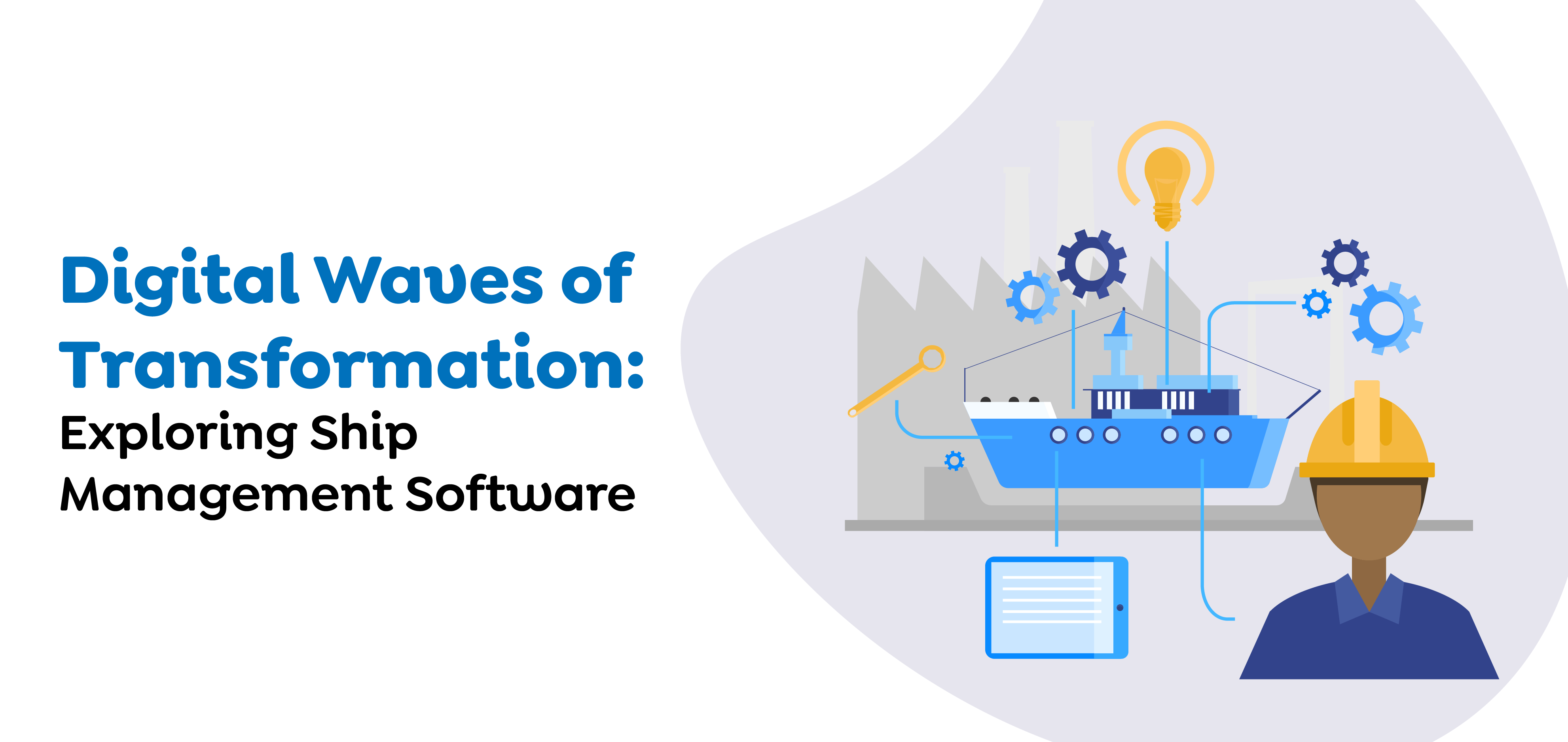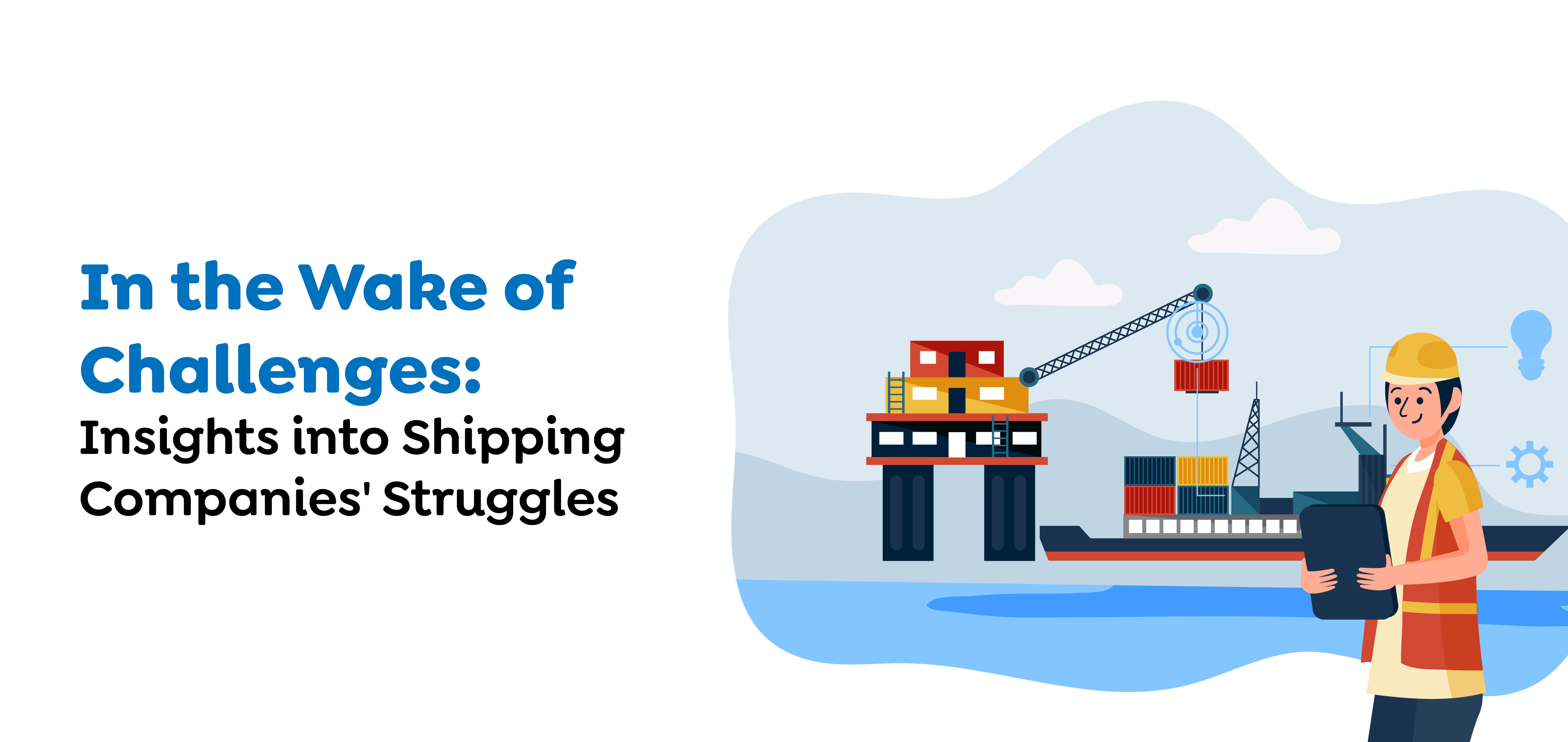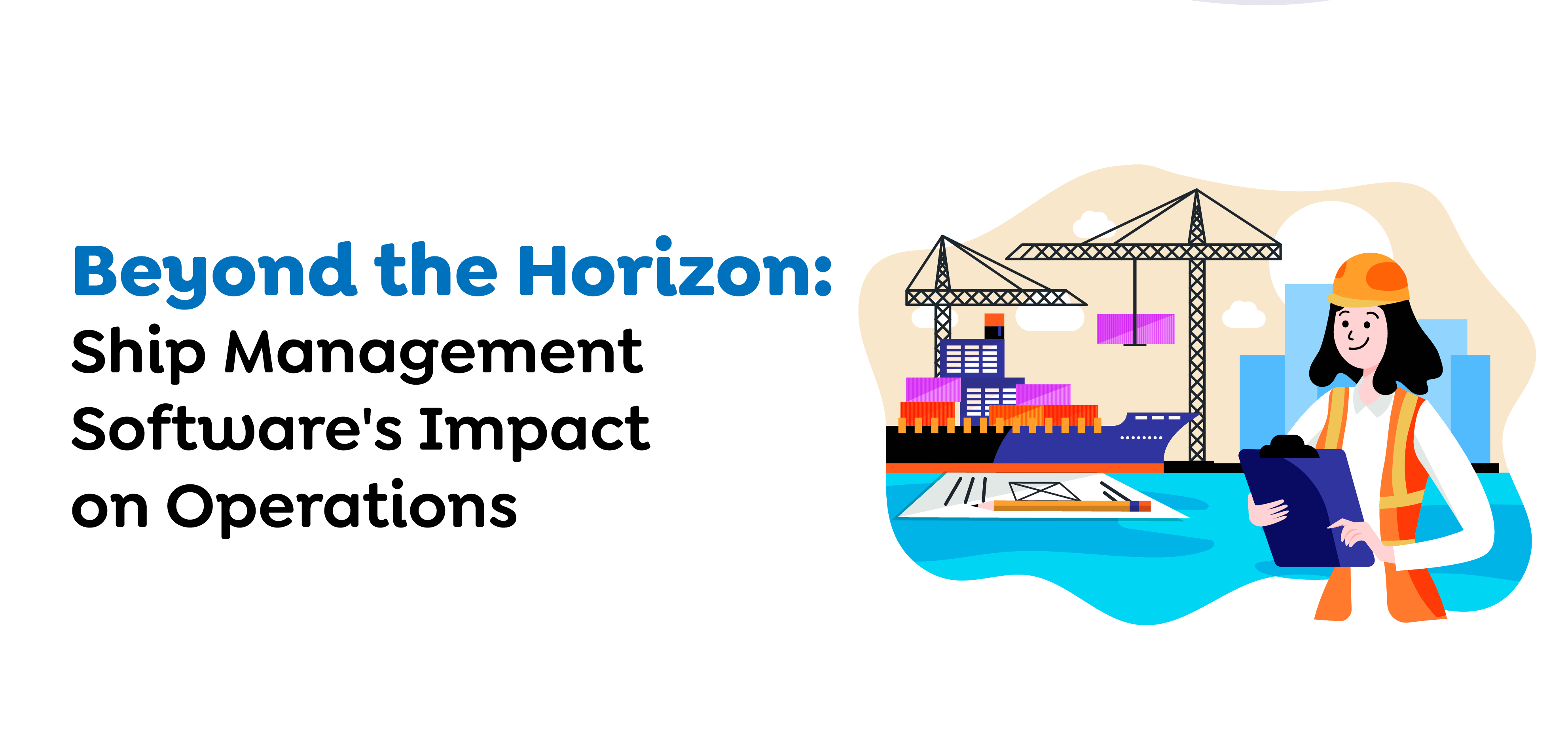29 Sep 2023
Ship Management Software Reshaping the Logistics Industry: Harnessing the Potential!
Surbhi Bhatia

A customer places an order with a business, the business begins packing all the goods in one go, the package is all set for the consumer, but what next? Shipping of goods need to be taken care of!
Indeed, it can be extremely overwhemlming for a business to ship out hundreds of packages at home; therefore, here’s when a reliable ship management software comes into play.
Notably, the logistics market is all set to expand from $10.76 Billion in 2018 to $17.45 Billion by the end of 2023. Which is why, shipping management system is being popularly adopted by businesses and is emerging as a viable solution.
Indeed, who wouldn’t want to experience a holistic management? Thus, here’s a guide for you to learn everything about developing a ship management software for your organization.
Let’s begin without further ado!
Introduction To Ship Management Software
 In the ever-evolving world of logistics, efficiency and precision are paramount. To meet the demands of the modern shipping industry, the introduction of ship management software has been nothing short of revolutionary.
In the ever-evolving world of logistics, efficiency and precision are paramount. To meet the demands of the modern shipping industry, the introduction of ship management software has been nothing short of revolutionary.
Traditionally, managing logistics was a labor-intensive process, with numerous complexities and challenges. Keeping track of schedules, maintenance, employee management, safety protocols, and cargo logistics required planning and coordination. However, as technology has advanced, so too has the industry’s ability to harness it for more efficient operations.
As we delve deeper into this article, we’ll explore how ship management software operates, the benefits it brings to shipping companies, the challenges it helps to overcome, and its pivotal role in reshaping the logistics industry. Stay with us as we navigate the seas of technological innovation in logistics.
Smooth Sailing: How Ship Management Software Steers the Way!
Ship management software operates as the digital captain of a vessel, orchestrating a symphony of data, automation, and communication. Its intricate working mechanism is the heartbeat of modern logistics, enabling shipping companies to navigate challenges with precision and efficiency. In this section, we’ll dive into the core components and functionalities that power ship management software.
Data Integration: The Navigator of Insights
At the heart of ship management software is data integration. Logistics are equipped with a plethora of systems that collect vital information about their condition, location, fuel consumption, and more. This data, when integrated into the software, forms the foundation of informed decision-making. Here’s how it works:
– Data Aggregation: The software aggregates data from various sources, including onboard sensors, weather reports, communication, and even historical performance records. This wealth of information is constantly updated in real-time.
– Data Analysis: Advanced algorithms analyze this data to provide insights into conveyance performance, safety compliance, fuel efficiency, and maintenance needs. These insights are accessible to operators and can trigger automated responses.
– Reporting: Detailed reports are generated, offering a comprehensive overview of a vessel’s health, operational efficiency, and compliance with regulations. These reports aid in strategic planning and decision-making.
Automation: The First Mate of Efficiency
One of the most significant advantages of ship management software is automation. Routine tasks that were once labor-intensive and time-consuming are now executed seamlessly. Here’s how automation plays a pivotal role:
– Scheduling: Automated scheduling optimizes routes, routines, and executive rotations. This not only saves time but also reduces fuel consumption and operational costs.
– Inventory Management: Inventory levels of critical supplies are continuously monitored. When thresholds are met, the software triggers reordering or alerts for restocking. Thus, inventory management is taken care of efficiently.
– Compliance Reporting: Compliance with safety, environmental, and labor regulations is closely monitored. The software generates reports and alerts when non-compliance is detected, ensuring adherence to legal standards.
Communication: Bridging the Divide
– Messaging Systems: Executives can communicate securely and efficiently using messaging systems integrated into the software. This ensures swift decision-making and problem-solving, even in remote areas.
– Data Sharing: Important documents, updates, and navigational charts can be shared seamlessly between executives and headquarters, ensuring that everyone is on the same page.
– Emergency Alerts: The software is equipped to send out emergency alerts and notifications in case of adverse weather conditions, mechanical failures, or safety incidents.
How about fabricating a ship management software for your business? If you agree, now is the best shot to work on the idea by collaborating with an efficient app development company.
Understanding the Challenges Faced by Shipping Companies
 In the vast world of logistics, shipping companies navigate through a sea of challenges to keep goods flowing across the globe efficiently and reliably. These challenges are not only complex but also continuously evolving due to factors like globalization, environmental concerns, and technological advancements. In this section, we’ll explore some of the most prominent challenges that shipping companies encounter in their daily operations.
In the vast world of logistics, shipping companies navigate through a sea of challenges to keep goods flowing across the globe efficiently and reliably. These challenges are not only complex but also continuously evolving due to factors like globalization, environmental concerns, and technological advancements. In this section, we’ll explore some of the most prominent challenges that shipping companies encounter in their daily operations.
1. Volatile Market Conditions
Shipping companies often find themselves at the mercy of volatile market conditions. Fluctuating demand, changing trade routes, and unpredictable economic trends can lead to uncertainty in pricing and profitability. Sudden shifts in global events, such as the COVID-19 pandemic, can disrupt supply chains and further exacerbate these challenges.
2. Environmental Regulations
Environmental concerns and the need to reduce carbon emissions are driving the industry towards stricter regulations. Compliance with these regulations requires significant investments in cleaner technologies, which can be financially burdensome for many shipping companies. Balancing environmental responsibility with profitability remains a critical challenge.
3. Safety and Security
Ensuring the safety and security is a constant concern for shipping companies. Piracy, accidents, and natural reasons can pose significant risks. Companies must invest in safety measures, training, and security protocols to mitigate these threats effectively.
4. Crew Management and Training
Recruiting and retaining skilled members is an ongoing challenge. Shipping companies need to provide competitive compensation, maintain high safety standards, and offer opportunities for professional development via management and training software to attract and retain people.
5. Technological Advancements
While technology can greatly improve operations, staying up-to-date with rapidly evolving digital tools and ship management software can be a challenge for shipping companies. The adoption of new technologies requires investment in training and infrastructure, which may not always align with budget constraints.
6. Global Competition
The industry is highly competitive, with numerous players vying for market share. Maintaining a competitive edge requires constant innovation and efficiency improvements. Companies must also navigate the complexities of international trade and shipping regulations to remain competitive on a global scale.
7. Infrastructure and Congestion
Congestion and inadequate infrastructure can lead to delays and increased operational costs. Shipping companies often grapple with these challenges, particularly in regions where facilities are outdated or overloaded.
8. Cargo Theft and Damage
Protecting cargo from theft and damage during transit is a continuous concern. Shipping companies must implement robust security measures and tracking systems to safeguard valuable goods.
Understanding these challenges is the first step towards addressing them effectively. Thus, get in touch with a company with relevant experience that could initiate necessary steps towards logistics app development.
Practical Applications of Ship Management Software
 Explore some key use cases of ship management software, showcasing how it transforms various facets of logistics operations.
Explore some key use cases of ship management software, showcasing how it transforms various facets of logistics operations.
1. Real-Time Fleet Tracking and Monitoring
Shipping management software serves as the digital navigator for fleets, providing real-time data on their location, condition, and performance. This use case is pivotal for optimizing routes, ensuring timely deliveries, and enhancing overall operational efficiency. Companies can monitor their entire fleet from a centralized dashboard, enabling proactive decision-making and swift responses to changing conditions.
2. Cargo Management and Tracking
Efficient cargo management is a critical aspect of logistics. Shipping management software allows companies to track and manage cargo in real-time throughout its journey. This not only ensures the secure and timely delivery of goods but also minimizes the risk of theft, damage, or loss. With accurate cargo tracking, companies can provide customers with up-to-date information, improving customer satisfaction.
3. Safety and Compliance
Safety and compliance with international regulations are paramount in the shipping industry. Shipping management software includes features that help companies adhere to safety standards, environmental regulations, and labor laws. By ensuring compliance, companies reduce the risk of accidents, environmental violations, and costly fines.
4. Maintenance and Repairs
Proactive maintenance is crucial to preventing costly breakdowns. Thus, an on-demand app development company will prioritize shipping management software that assists in tracking maintenance schedules and issues, ensuring that vessels receive timely servicing and repairs. This not only reduces downtime but also extends the lifespan of critical equipment, saving both time and money.
5. Inventory and Resource Management
Effective inventory management is essential for keeping well-equipped with spare parts, fuel, and provisions. Shipping management software continuously monitors inventory levels and can trigger reordering or alerts when supplies are running low. Additionally, it optimizes resource allocation, reducing operational costs and improving overall efficiency.
6. Reporting and Analytics
Data analysis is a powerful tool for decision-making. Shipping management software provides robust reporting and analytics capabilities, enabling shipping companies to gain valuable insights into their operations. These insights inform strategic planning and help companies identify areas for improvement.
7. Route Optimization
Efficient route planning is vital for reducing fuel consumption and transit times. Shipping management software uses real-time data on weather conditions, traffic, and vessel performance to optimize routes and adapt to changing circumstances. This leads to significant cost savings and shorter delivery times.
These use cases showcase the versatility and transformative power of shipping management software. By harnessing this technology, shipping companies can navigate the complexities of modern logistics with greater precision, efficiency, and success.
To Sum Up!
In the ever-evolving world of logistics, adaptation and innovation are not just pathways to success; they are the very essence of survival. As we’ve navigated through the details of ship management software and its profound impact on the logistics industry, it’s abundantly clear that this technology is at the helm of transformation.
In a world where every minute counts, and the global supply chain operates around the clock, having the ability to track transportation in real time, optimize routes, ensure safety compliance, and manage resources with precision is no longer a luxury—it’s a necessity. Shipping management software is not just reshaping the logistics industry; it’s revolutionizing it.
The logistics industry is not merely undergoing a transformation; it’s setting a new course, one that leverages technology, data, and innovation to create a more efficient, safe, and sustainable future.
So, are you all set to work on the idea? Then, partner with Techugo- a reliable mobile app development company in USA for further insights on the subject.
Happy innovation!
Get in touch.
Write Us
sales@techugo.comOr fill this form















